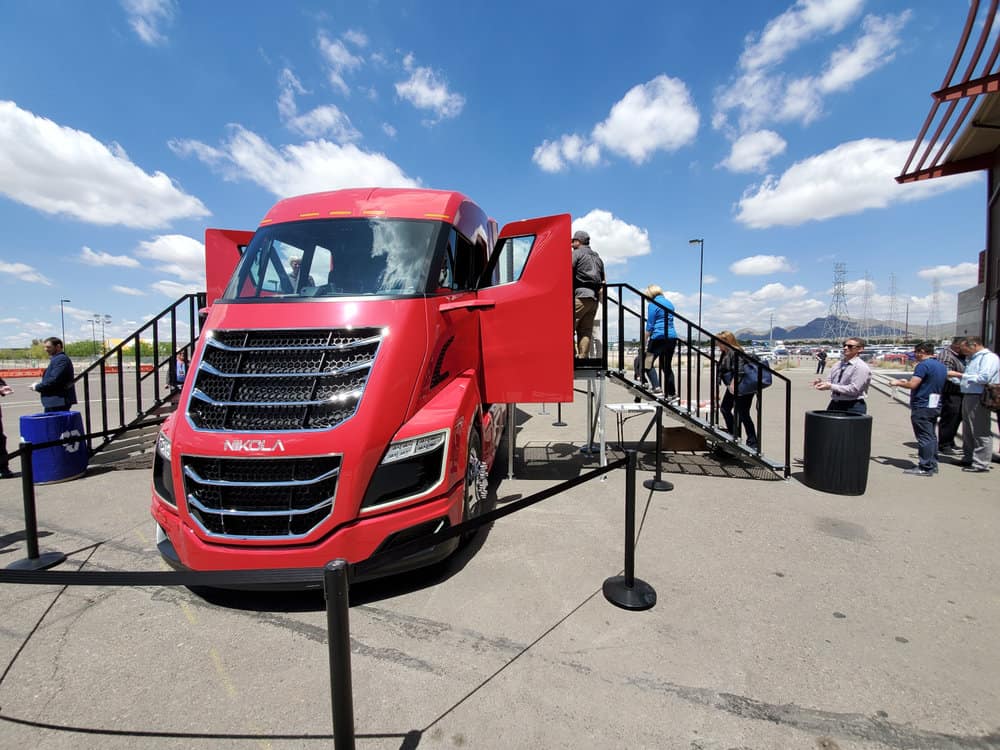
The first announcement of the Nikola Motor hydrogen-electric truck brought out a heavy-hitter when it came to an initial fleet interested in trying this new tractor design. U.S. Xpress Enterprises (NYSE: USX) committed early to testing the vehicle. Many of the first images of the truck featured U.S. Xpress on the side.
“There’s an intersect here in the next five or six years where battery technology may overtake diesel [in operational cost],” Max Fuller, USX chairman, told FreightWaves in 2017. He explained that the Nikola One truck could represent a 30 percent to 50 percent cost reduction per truck for his fleet. “[Nikola’s] providing the fuel, so I have a fixed cost, whereas the price of diesel is volatile. The incentive is to get out of the whole diesel volatility cycle. It really is something we can’t control but it impacts our bottom line greatly.”
Nikola Motor is promising to provide 1 million miles of hydrogen fuel, plus maintenance, tires and some ancillary items such as truck washes as part of a monthly lease program. Fleets and owner-operators can also choose to purchase the truck and those items will still be covered, said Trevor Milton, Nikola Motor’s founder & CEO, at the time.
In early 2018, two more heavyweights joined the Nikola bandwagon as interest and demand for the vehicle grew. Ryder (NYSE: R) and Anheuser-Busch (NYSE: BUD) came on board as customers, with Ryder providing all sales and service warranty coverage in the transaction that could see Anheuser Busch buy up to 800 Nikola Two day cab models.
In all, at least 14,000 of the trucks have been ordered to date, so there has been plenty of interest.
“Ryder is going to be there to handle all the logistics behind these trucks, to make sure we have parts for these trucks … and also to make sure we have hydrogen at all the stations,” Trevor Milton, Nikola CEO, said at the time.
Anheuser-Busch has a broader mission – to create an emissions-free vehicle fleet that will result in the company converting 100 percent of its dedicated fleet to sustainable sources by 2025.
“As an industry leader, we feel it is our responsibility to pull the industry forward,” said Ingrid De Ryck, Anheuser-Busch vice president of procurement & sustainability.
De Ryck spoke again at Nikola World 2019, held on April 16-17 in Scottsdale, Arizona at WestWorld, and she reiterated how happy the company is working with Nikola.
“I cannot wait to see your truck pull a load of Budweiser,” she told Milton on stage. “We need to give those Clydesdales a break.”
Anheuser-Busch’s dedicated fleet is between 750 and 900 trucks, the company said, representing about one-third of the company’s total shipments, so if the full 800 trucks are deployed, it could mean nearly 100 percent of the Anheuser-Busch fleet could be supplied by Nikola Motor.
“By partnering with Nikola … we will reduce our carbon emissions from logistics by 18 percent,” De Ryck noted.
“We have a great relationship with Anheuser-Busch, which has ordered 800 trucks,” Milton said at the event. “What’s even more impressive than 800 trucks is that those trucks will travel 800 million zero-emission miles.”
The Nikola Two has a range of between 500 and 1,200 miles, produces zero emissions and can be refueled in 20 minutes, De Ryck said.
In August 2018, Nikola claimed to have $11 billion in pre-orders for the vehicle; that number has grown and is now said to be more than $14 billion, including orders for its Nikola Tre, a version of the truck for the European and Australian markets.
The demand has been so great that the company is not really accepting new orders at this time, Milton said.
“We have a backlog that exceeds what we can build for the next several years,” explained Mark Russell, president of Nikola Motor.







